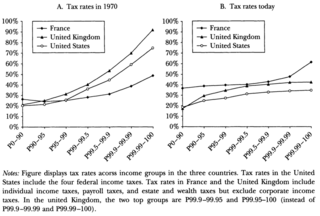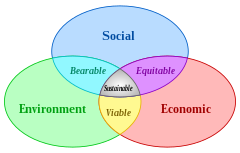A tax is a compulsory financial charge or some other type of levy imposed on a taxpayer by a governmental organization in order to collectively fund government spending, public expenditures, or as a way to regulate and reduce negative externalities. Tax compliance refers to policy actions and individual behaviour aimed at ensuring that taxpayers are paying the right amount of tax at the right time and securing the correct tax allowances and tax relief. The first known taxation took place in Ancient Egypt around 3000–2800 BC. Taxes consist of direct or indirect taxes and may be paid in money or as its labor equivalent.
Pareto efficiency or Pareto optimality is a situation where no action or allocation is available that makes one individual better off without making another worse off. The concept is named after Vilfredo Pareto (1848–1923), Italian civil engineer and economist, who used the concept in his studies of economic efficiency and income distribution. The following three concepts are closely related:
This aims to be a complete article list of economics topics:

In sociology and in economics, the term conspicuous consumption describes and explains the consumer practice of buying and using goods of a higher quality, price, or in greater quantity than practical. In 1899, the sociologist Thorstein Veblen coined the term conspicuous consumption to explain the spending of money on and the acquiring of luxury commodities specifically as a public display of economic power—the income and the accumulated wealth—of the buyer. To the conspicuous consumer, the public display of discretionary income is an economic means of either attaining or of maintaining a given social status.

Public finance is the study of the role of the government in the economy. It is the branch of economics that assesses the government revenue and government expenditure of the public authorities and the adjustment of one or the other to achieve desirable effects and avoid undesirable ones. The purview of public finance is considered to be threefold, consisting of governmental effects on:
- The efficient allocation of available resources;
- The distribution of income among citizens; and
- The stability of the economy.

A progressive tax is a tax in which the tax rate increases as the taxable amount increases. The term progressive refers to the way the tax rate progresses from low to high, with the result that a taxpayer's average tax rate is less than the person's marginal tax rate. The term can be applied to individual taxes or to a tax system as a whole. Progressive taxes are imposed in an attempt to reduce the tax incidence of people with a lower ability to pay, as such taxes shift the incidence increasingly to those with a higher ability-to-pay. The opposite of a progressive tax is a regressive tax, such as a sales tax, where the poor pay a larger proportion of their income compared to the rich
Welfare economics is a field of economics that applies microeconomic techniques to evaluate the overall well-being (welfare) of a society. This evaluation is typically done at the economy-wide level, and attempts to assess the distribution of resources and opportunities among members of society.

Sir James Alexander Mirrlees was a British economist and winner of the 1996 Nobel Memorial Prize in Economic Sciences. He was knighted in the 1997 Birthday Honours.

Tax policy refers to the guidelines and principles established by a government for the imposition and collection of taxes. It encompasses both microeconomic and macroeconomic aspects, with the former focusing on issues of fairness and efficiency in tax collection, and the latter focusing on the overall quantity of taxes to be collected and its impact on economic activity. The tax framework of a country is considered a crucial instrument for influencing the country's economy.
Optimal tax theory or the theory of optimal taxation is the study of designing and implementing a tax that maximises a social welfare function subject to economic constraints. The social welfare function used is typically a function of individuals' utilities, most commonly some form of utilitarian function, so the tax system is chosen to maximise the aggregate of individual utilities. Tax revenue is required to fund the provision of public goods and other government services, as well as for redistribution from rich to poor individuals. However, most taxes distort individual behavior, because the activity that is taxed becomes relatively less desirable; for instance, taxes on labour income reduce the incentive to work. The optimization problem involves minimizing the distortions caused by taxation, while achieving desired levels of redistribution and revenue. Some taxes are thought to be less distorting, such as lump-sum taxes and Pigouvian taxes, where the market consumption of a good is inefficient, and a tax brings consumption closer to the efficient level.
Economic justice is a component of social justice and welfare economics. It is a set of moral and ethical principles for building economic institutions, where the ultimate goal is to create an opportunity for each person to establish a sufficient material foundation upon which to have a dignified, productive, and creative life.."
The Robin Hood effect is an economic occurrence where income is redistributed so that economic inequality is reduced. That is a redistribution of economic resources due to which the economically disadvantaged gain at the expense of the economically advantaged. The effect is named after English folkloric figure Robin Hood, said to have stolen from the rich to give to the poor.
Public economics(or economics of the public sector) is the study of government policy through the lens of economic efficiency and equity. Public economics builds on the theory of welfare economics and is ultimately used as a tool to improve social welfare. Welfare can be defined in terms of well-being, prosperity, and overall state of being.
Redistribution of income and wealth is the transfer of income and wealth from some individuals to others through a social mechanism such as taxation, welfare, public services, land reform, monetary policies, confiscation, divorce or tort law. The term typically refers to redistribution on an economy-wide basis rather than between selected individuals.
Serge-Christophe Kolm is a French economist. His work in economics and related social science includes his analyses, concepts and results in Public Economics and Normative Economics focusing on equality, distributive justice, and efficiency of economic measures, and in other fields and problems often applying them.
Several theories of taxation exist in public economics. Governments at all levels need to raise revenue from a variety of sources to finance public-sector expenditures.
The benefit principle is a concept in the theory of taxation from public finance. It bases taxes to pay for public-goods expenditures on a politically-revealed willingness to pay for benefits received. The principle is sometimes likened to the function of prices in allocating private goods. In its use for assessing the efficiency of taxes and appraising fiscal policy, the benefit approach was initially developed by Knut Wicksell (1896) and Erik Lindahl (1919), two economists of the Stockholm School. Wicksell's near-unanimity formulation of the principle was premised on a just income distribution. The approach was extended in the work of Paul Samuelson, Richard Musgrave, and others. It has also been applied to such subjects as tax progressivity, corporation taxes, and taxes on property or wealth. The unanimity-rule aspect of Wicksell's approach in linking taxes and expenditures is cited as a point of departure for the study of constitutional economics in the work of James Buchanan.
Optimal capital income taxation is a subarea of optimal tax theory which studies the design of taxes on capital income such that a given economic criterion like utility is optimized.
The economics concept of a merit good, originated by Richard Musgrave, is a commodity which is judged that an individual or society should have on the basis of some concept of benefit, rather than ability and willingness to pay. The term is, perhaps, less often used presently than it was during the 1960s to 1980s but the concept still motivates many economic actions by governments. Examples include in-kind transfers such as the provision of food stamps to assist nutrition, the delivery of health services to improve quality of life and reduce morbidity, and subsidized housing and education.
This glossary of economics is a list of definitions of terms and concepts used in economics, its sub-disciplines, and related fields.




